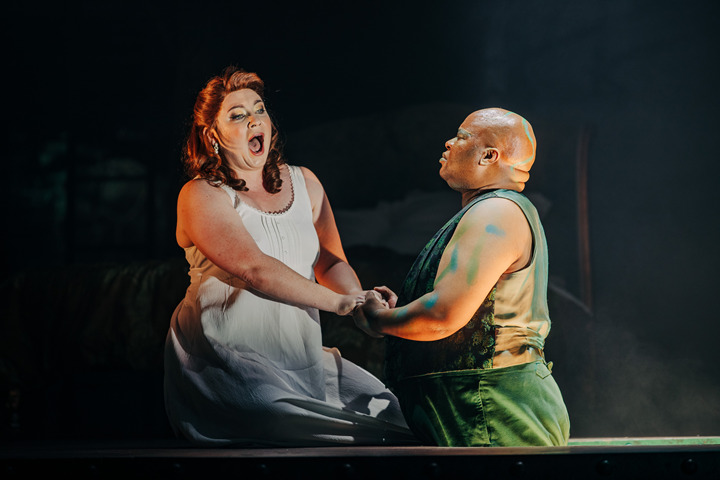| Opera Reviews | 25 April 2024 |
This Rusalka is as good as it getsby Catriona Graham |
|
Dvorak: Rusalka |
|
 |
|
|
Opening the opera programme at the Edinburgh International Festival is Dvorak’s Rusalka, with a libretto by Jaroslav Kvapil, in Jack Furness’s production for Garsington Opera. The curtain rises on Tom Piper’s set of ironwork galleries and ladders round three sides, a large circular manhole cover which is raised slowly on hawsers. A man lies on top of the hatch, trailing his fingers as if in water. A woman, dressed in a soft dull green, undulates towards him under the hatch, which is lit underneath with a projection of green, moving water. Her hands follow his. Then the nymphs arrive, climbing ladders, twirling round ropes, turning cartwheels – and singing. They are having enormous fun, except Rusalka. She wants to become human so she can love the prince properly. Her father, the water goblin Vodnik, powerfully sung by Musa Ngqungwana, advises against it, but gives in to her unhappiness, and sends her to the land-based witch, Jezibaba. As light shines through the interface between water and land, Natalya Romaniw’s rich voice and precision in Rusalka’s Song to the Moon is an intimation of the class of this performance. Rusalka has feet and legs, not a fishtail, but she can’t use them on land yet. Christine Rice, as a rather glamorous and kindly witch albeit living in a skull, gives her that power, but at a great future cost as well as muteness. In the midst of a hunt, a young huntsman sings of a white doe, Gerard Schneider’s Prince sends the hunt home, meets and falls for Rusalka. Next, somewhat tipsy gentlemen in evening dress appear through the curtain which rises on the gamelarder-come-kitchen, where a gamekeeper arrives with another doe, to gossip with the cook about the goings-on in the palace. Ivory-white-clad Rusalka can only convey her feelings through eyes and touch, so the Prince responds to the Foreign Princess – an elegant and eloquent Sky Ingram in rich red velvet. The supercilious court ladies both snub and dress Rusalka for her wedding then, after an exquisitely choreographed ball, the ladies and gentlemen of the court undress her for the wedding night and oversee the unsuccessful bedding. Back at the lakeside, her sister nymphs cluster like tadpoles under a lilyleaf and spurn her. Romaniw is full of pain and despair as she returns to Jezibaba for help. There is a way – murdering the prince but, instead, Rusalka throws the witch’s knife (and with it her power) into the water, where the witch can’t reach it. She is still weak when the palace servants (John Findon and Grace Durham) come to seek a spell to cure the prince. Then the prince himself comes – he craves her kiss and she knows it will be fatal but she gives in. Schneider’s voice, in his death song, is so tender and sweet. Romaniw’s, as she begs God for his mercy on the prince’s soul, is soaring, then she walks into the warm light of her future. Malcom Rippeth’s lighting is superb – sub-aqueous green, pale moonlight and warmth in the human world. As for the Philharmonia Orchestra conducted by Douglas Boyd, as was heard afterwards, “I’ve never before seen the tenor whistling for the orchestra!” ‘Nuff said. The crescendo at the start of Act 3 was breath-taking in its control and fluidity, the orchestral echoes precise, the range of colours and styles all-encompassing. Furness eschews a didactic approach to Dvorak’s fairytale but, if there is a moral, it is Be Careful What You Wish For. You couldn’t wish for better than this. |
|
Photo © Andew Perry |
|







